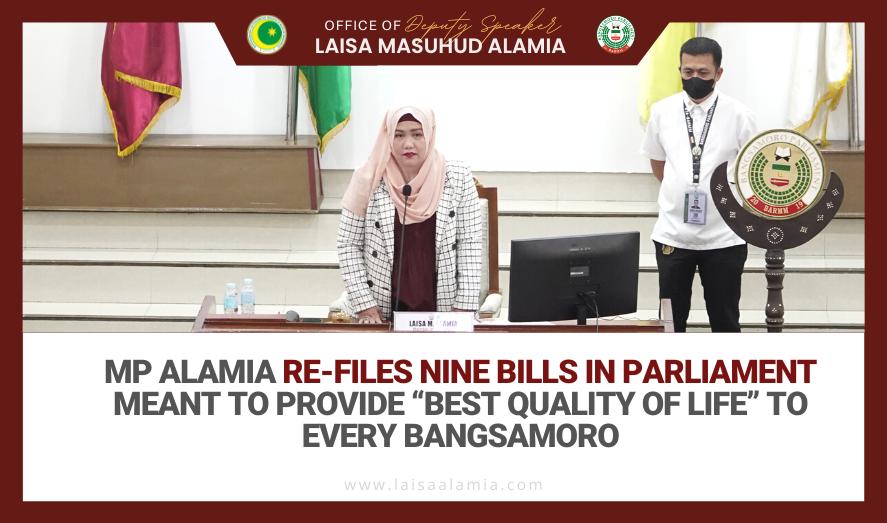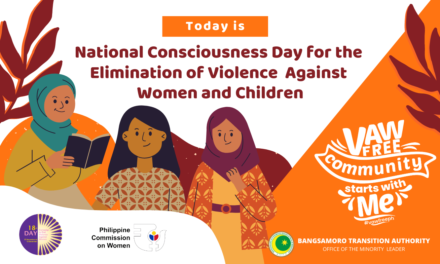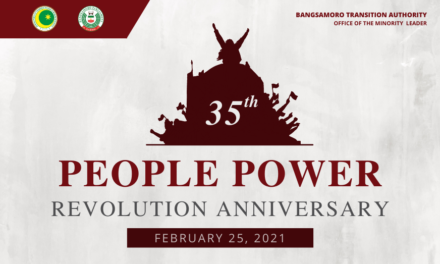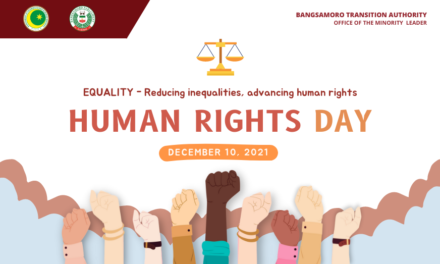MP Alamia re-files nine bills in Parliament meant to provide “best quality of life” to every Bangsamoro
Determined to pass laws relevant to the plight of the Bangsamoro, Deputy Speaker MP Laisa Alamia has re-filed nine bills in the parliament – all of which have transitional justice at its core. These bills include the Internally Displaced Persons (IDP) Rights Bill, bills that link the Bangsamoro’s right to land and right to education, and a suite of bills that seek to institutionalize transitional justice measures in the regional government.
“The goal of legislation is to make the best quality of life possible for every Bangsamoro,” MP Alamia said. “We cannot achieve this if we ignore the most pressing needs of our communities, especially in a post-conflict context.”
Government must reduce risk of displacement, prevent arbitrary displacements
“As members of parliament representing the interests of the Bangsamoro people in the regional government, we must amplify the voices of the underprivileged and disadvantaged if they are to benefit from the political transition at all,” MP Alamia said regarding the need to pass a law that addresses the needs of IDPs.
In the past two decades, more than four million Filipinos in Mindanao have suffered from displacement due to armed conflict, natural hazards, and persistent poverty. This is multiplied by issues of food scarcity and climate change in the Bangsamoro region which, for the greater part of the last ten years, has always been an agricultural region. This means that a law that directly addresses the root causes and effects of internal displacement must be a priority of the regional government.
“If we, as one BTA, can finally pass a law that clearly acknowledges internal displacement and addresses its longstanding effects on our communities, it would send a strong message,” MP Alamia said. “It would be a message that not only reiterates our commitment to address the challenges our people face, but also comforts and reassures them as we continue to work on just and lasting peace in the region,” she emphasized.
MP Alamia first filed the IDP Rights Bill in October 2019, and has remained stagnant at the first reading stage in the last parliament.
Peacebuilding requires transitional justice and reconciliation mechanisms
MP Alamia has also re-filed the Regional Transitional Justice and Reconciliation Commission for the Bangsamoro Bill, which she first submitted along with a suite of TJR bills to the parliament in October 2021.
“Transitional justice and reconciliation are made possible not only by sheer will but by regular appropriations that will fund institutions meant to fulfill TJR benchmarks,” MP Alamia stressed. “To do all this in support of our work for just and lasting peace, legislation is absolutely necessary,” she said.
Among the bills MP Alamia filed alongside the IDP Rights Bill and TJRC Bill are the Bangsamoro Armed Conflict Human Rights Violations Documentation Bill, Bangsamoro Armed Conflict Human Rights Violations Documentation Bill, and the Bangsamoro Mujahideen/Mujahidat Benefits System Bill.
In her first term as a member of parliament, MP Alamia has emphasized early on that part of the Bangsamoro Government’s mandate is to “address human rights violations committed against the peoples of the Bangsamoro, and other past and present inhabitants of the Bangsamoro Region.”
Growth and development in the region only possible with just and sustainable agriculture
MP Alamia has also re-filed two bills that she hopes will drive youth participation and involvement in the agricultural sector, as part of efforts to revitalize sustainable resource management in the region. These bills are the Bangsamoro Education Incentive Act, and the Agriculture Scholarship and Return Service Program Act.
Both bills were drafted in direct consultation with the FAO Legislative Advisory Group – Youth in BARMM (Bangsamoro FLAG Youth), a network of youth organizations, with guidance and support from the Kalisa Action Network (KalisaAN) and the Food and Agriculture Organization of the United Nations (FAO).
“Agriculture has always been the lifeblood not only of the Bangsamoro, but the entire Philippines,” MP Alamia said. “Working towards just and lasting peace means working towards food security, and building a future where agriculture is a priority,” she said.
“For so long, our farmers and fisherfolk have remained among the poorest sectors of our society,” MP Alamia noted. “We must take steps to change this, while encouraging our youth to take on a more active role in nurturing the land our ancestors have fought for with their own lives.”
MP Alamia re-files nine bills in Parliament meant to provide “best quality of life” to every Bangsamoro
Determined to pass laws relevant to the plight of the Bangsamoro, Deputy Speaker MP Laisa Alamia has re-filed nine bills in the parliament – all of which have transitional justice at its core. These bills include the Internally Displaced Persons (IDP) Rights Bill, bills that link the Bangsamoro’s right to land and right to education, and a suite of bills that seek to institutionalize transitional justice measures in the regional government.
“The goal of legislation is to make the best quality of life possible for every Bangsamoro,” MP Alamia said. “We cannot achieve this if we ignore the most pressing needs of our communities, especially in a post-conflict context.”
Government must reduce risk of displacement, prevent arbitrary displacements
“As members of parliament representing the interests of the Bangsamoro people in the regional government, we must amplify the voices of the underprivileged and disadvantaged if they are to benefit from the political transition at all,” MP Alamia said regarding the need to pass a law that addresses the needs of IDPs.
In the past two decades, more than four million Filipinos in Mindanao have suffered from displacement due to armed conflict, natural hazards, and persistent poverty. This is multiplied by issues of food scarcity and climate change in the Bangsamoro region which, for the greater part of the last ten years, has always been an agricultural region. This means that a law that directly addresses the root causes and effects of internal displacement must be a priority of the regional government.
“If we, as one BTA, can finally pass a law that clearly acknowledges internal displacement and addresses its longstanding effects on our communities, it would send a strong message,” MP Alamia said. “It would be a message that not only reiterates our commitment to address the challenges our people face, but also comforts and reassures them as we continue to work on just and lasting peace in the region,” she emphasized.
MP Alamia first filed the IDP Rights Bill in October 2019, and has remained stagnant at the first reading stage in the last parliament.
Peacebuilding requires transitional justice and reconciliation mechanisms
MP Alamia has also re-filed the Regional Transitional Justice and Reconciliation Commission for the Bangsamoro Bill, which she first submitted along with a suite of TJR bills to the parliament in October 2021.
“Transitional justice and reconciliation are made possible not only by sheer will but by regular appropriations that will fund institutions meant to fulfill TJR benchmarks,” MP Alamia stressed. “To do all this in support of our work for just and lasting peace, legislation is absolutely necessary,” she said.
Among the bills MP Alamia filed alongside the IDP Rights Bill and TJRC Bill are the Bangsamoro Armed Conflict Human Rights Violations Documentation Bill, Bangsamoro Armed Conflict Human Rights Violations Documentation Bill, and the Bangsamoro Mujahideen/Mujahidat Benefits System Bill.
In her first term as a member of parliament, MP Alamia has emphasized early on that part of the Bangsamoro Government’s mandate is to “address human rights violations committed against the peoples of the Bangsamoro, and other past and present inhabitants of the Bangsamoro Region.”
Growth and development in the region only possible with just and sustainable agriculture
MP Alamia has also re-filed two bills that she hopes will drive youth participation and involvement in the agricultural sector, as part of efforts to revitalize sustainable resource management in the region. These bills are the Bangsamoro Education Incentive Act, and the Agriculture Scholarship and Return Service Program Act.
Both bills were drafted in direct consultation with the FAO Legislative Advisory Group – Youth in BARMM (Bangsamoro FLAG Youth), a network of youth organizations, with guidance and support from the Kalisa Action Network (KalisaAN) and the Food and Agriculture Organization of the United Nations (FAO).
“Agriculture has always been the lifeblood not only of the Bangsamoro, but the entire Philippines,” MP Alamia said. “Working towards just and lasting peace means working towards food security, and building a future where agriculture is a priority,” she said.
“For so long, our farmers and fisherfolk have remained among the poorest sectors of our society,” MP Alamia noted. “We must take steps to change this, while encouraging our youth to take on a more active role in nurturing the land our ancestors have fought for with their own lives.”








